Regulierung internationaler Finanzmärkte und Banken
Diese Forschungsgruppe analysiert Ursachen und Konsequenzen von internationalen Aktivitäten von Banken sowie den regulatorischen Rahmen, innerhalb dessen globale Banken operieren.
International aktive Banken können eine effiziente internationale Kapitalallokation vereinfachen und zur internationalen Risikoteilung beitragen. Allerdings können sie auch Instabilitäten generieren und zu einer Übertragung von Schocks über nationale Grenzen hinaus beitragen. Dies ist einer der Gründe für die aktuelle Re-Regulierung des internationalen Bankensystems.
Die Forschungsgruppe trägt auf drei verschiedenen Wegen zur Literatur bei. Erstens analysiert die Gruppe empirisch, warum internationale Banken global aktiv sind und wie Schocks im Finanzsystem übertragen werden. Zweitens untersucht die Gruppe das Entstehen von systemischen Risiken und Ungleichgewichten im integrierten Bankenmarkt und die sich daraus ergebenden Konsequenzen für die Realwirtschaft. Drittens werden die Auswirkungen von Änderungen bezüglich der Bankenaufsicht und Bankenregulierung analysiert, mit einem besonderen Fokus auf dem europäischen Integrationsprozess
IWH-Datenprojekt: International Banking Library
Forschungscluster
Wirtschaftliche Dynamik und StabilitätIhr Kontakt

Mitglied - Abteilung Finanzmärkte
PROJEKTE
07.2017 ‐ 12.2022
Die politische Ökonomie der europäischen Bankenunion
Europäischer Sozialfonds (ESF)
Ursachen für nationale Unterschiede in der Umsetzung der Bankenunion und daraus resultierende Auswirkungen auf die Finanzstabilität.
01.2015 ‐ 12.2017
Dynamic Interactions between Banks and the Real Economy
Deutsche Forschungsgemeinschaft (DFG)
Referierte Publikationen
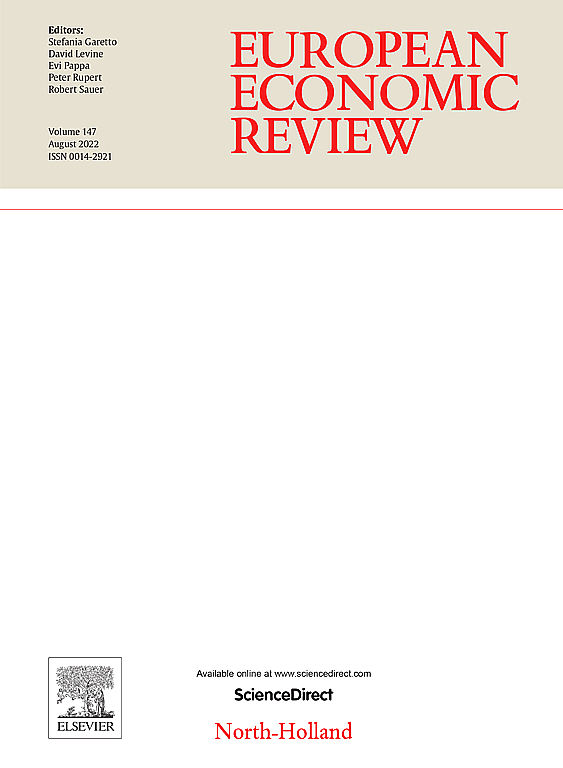
Completing the European Banking Union: Capital Cost Consequences for Credit Providers and Corporate Borrowers
in: European Economic Review, September 2022
Abstract
The bank recovery and resolution directive (BRRD) regulates the bail-in hierarchy to resolve distressed banks in the European Union (EU). Using the staggered BRRD implementation across 15 member states, we identify banks’ capital cost responses and subsequent pass-through to borrowers towards surprise elements due to national transposition details. Average bank capital costs increase heterogeneously across countries with strongest funding cost hikes observed for banks located in GIIPS and non-EMU countries. Only banks in core E(M)U countries that exhibit higher funding costs increase credit spreads for corporate borrowers and contract credit supply. Tighter credit conditions are only passed on to more levered and less profitable firms. On balance, the national implementation of BRRD appears to have strengthened financial system resilience without a pervasive hike in borrowing costs.

A Note of Caution on Quantifying Banks' Recapitalization Effects
in: Journal of Money, Credit and Banking, Nr. 4, 2022
Abstract
Unconventional monetary policy measures like asset purchase programs aim to reduce certain securities' yield and alter financial institutions' investment behavior. These measures increase the institutions' market value of securities and add to their equity positions. We show that the extent of this recapitalization effect crucially depends on the securities' accounting and valuation methods, country-level regulation, and maturity structure. We argue that future research needs to consider these factors when quantifying banks' recapitalization effects and consequent changes in banks' lending decisions to the real sector.

Technical Optimum of Bank Liquidity Creation
in: Revue Economique, Nr. 3, 2022
Abstract
This paper generates a technical optimum of bank liquidity creation benchmark by tracing an efficient frontier in liquidity creation (bank intermediation) and questions why some banks are more efficient than others in such activities. Evidence reveals that medium size banks are most correlated to efficient frontier. Small (large) banks—focused on traditional banking activities—are found to be the most (least) efficient in creating liquidity in on-balance sheet items whereas large banks—involved in non-traditional activities—are found to be most efficient in off-balance sheet liquidity creation. Additionally, the liquidity efficiency of small banks is more resilient during the 2007-2008 financial crisis relative to other banks.
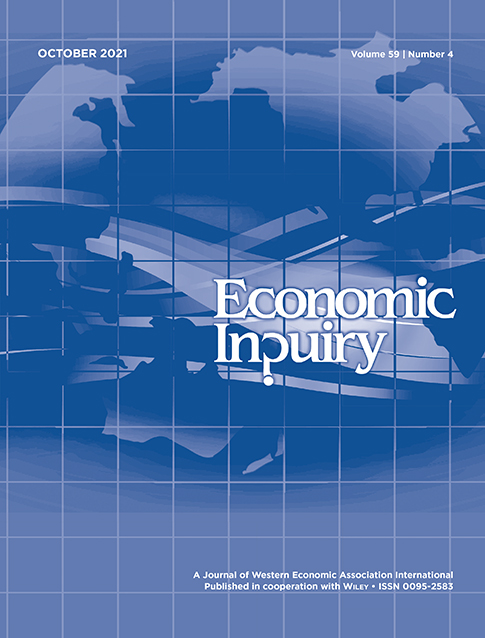
Firm-specific Forecast Errors and Asymmetric Investment Propensity
in: Economic Inquiry, Nr. 2, 2022
Abstract
This paper analyzes how firm-specific forecast errors derived from survey data of German manufacturing firms over 2007–2011 relate to firms' investment propensity. Our findings reveal that asymmetries arise depending on the size and direction of the forecast error. The investment propensity declines if the realized situation is worse than expected. However, firms do not adjust investment if the realized situation is better than expected suggesting that the uncertainty component of the forecast error counteracts good surprises of unexpectedly favorable business conditions. This asymmetric mechanism can be one explanation behind slow recovery following crises.

Gender, Credit, and Firm Outcomes
in: Journal of Financial and Quantitative Analysis, Nr. 1, 2022
Abstract
Small and micro enterprises are usually majority-owned by entrepreneurs. Using a unique sample of loan applications from such firms, we study the role of owners’ gender in bank credit decisions and post-credit-decision firm outcomes. We find that, ceteris paribus, female entrepreneurs are more prudent loan applicants than are males, since they are less likely to apply for credit or to default after loan origination. The relatively more aggressive behavior of male applicants pays off, however, in terms of higher average firm performance after loan origination.
Arbeitspapiere
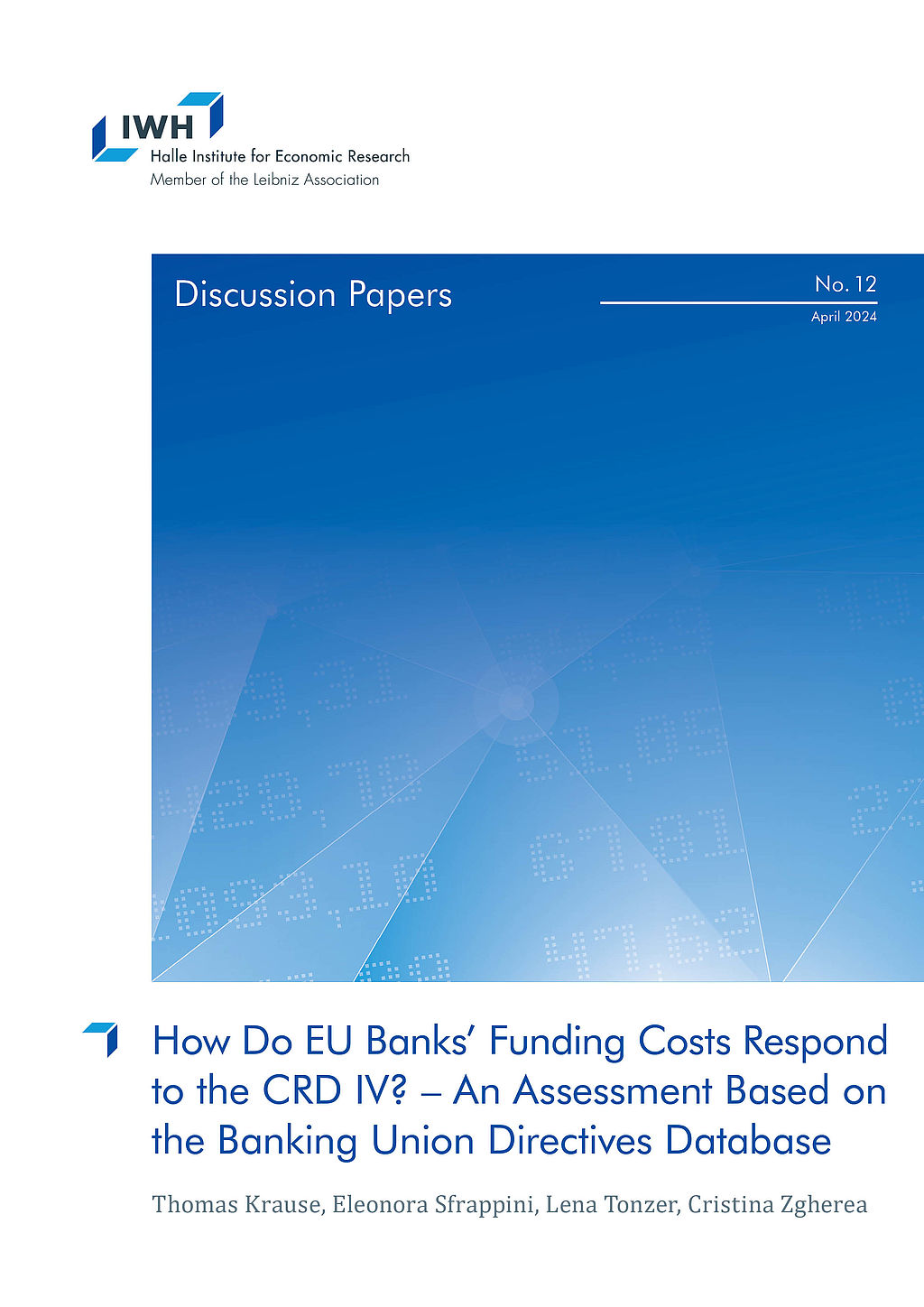
How Do EU Banks’ Funding Costs Respond to the CRD IV? An Assessment Based on the Banking Union Directives Database
in: IWH Discussion Papers, Nr. 12, 2024
Abstract
The establishment of the European Banking Union constitutes a major change in the regulatory framework of the banking system. Main parts are implemented via directives that show staggered transposition timing across EU member states. Based on the newly compiled Banking Union Directives Database, we assess how banks’ funding costs responded to the Capital Requirements Directive IV (CRD IV). Our findings show an upward trend in funding costs which is driven by an increase in cost of equity and partially offset by a decline in cost of debt. The diverging trends are most present in countries with an ex-ante lower regulatory capital stringency, which is in line with banks’ short-run adjustment needs but longer-run benefits from increased financial stability.
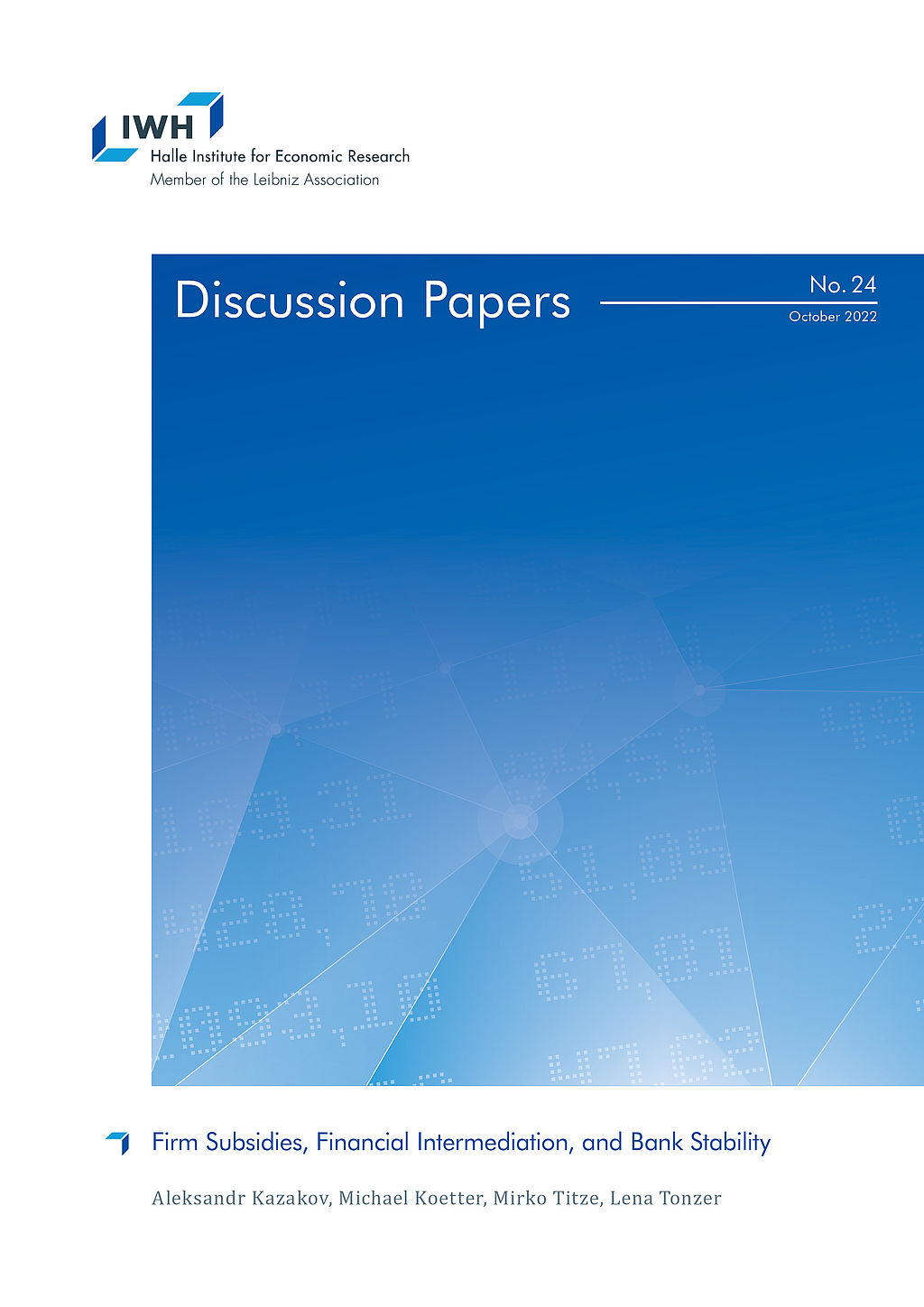
Firm Subsidies, Financial Intermediation, and Bank Stability
in: IWH Discussion Papers, Nr. 24, 2022
Abstract
We use granular project-level information for the largest regional economic development program in German history to study whether government subsidies to firms affect the quantity and quality of bank lending. We combine the universe of recipient firms under the Improvement of Regional Economic Structures program (GRW) with their local banks during 1998-2019. The modalities of GRW subsidies to firms are determined at the EU level. Therefore, we use it to identify bank outcomes. Banks with relationships to more subsidized firms exhibit higher lending volumes without any significant differences in bank stability. Subsidized firms, in turn, borrow more indicating that banks facilitate regional economic development policies.
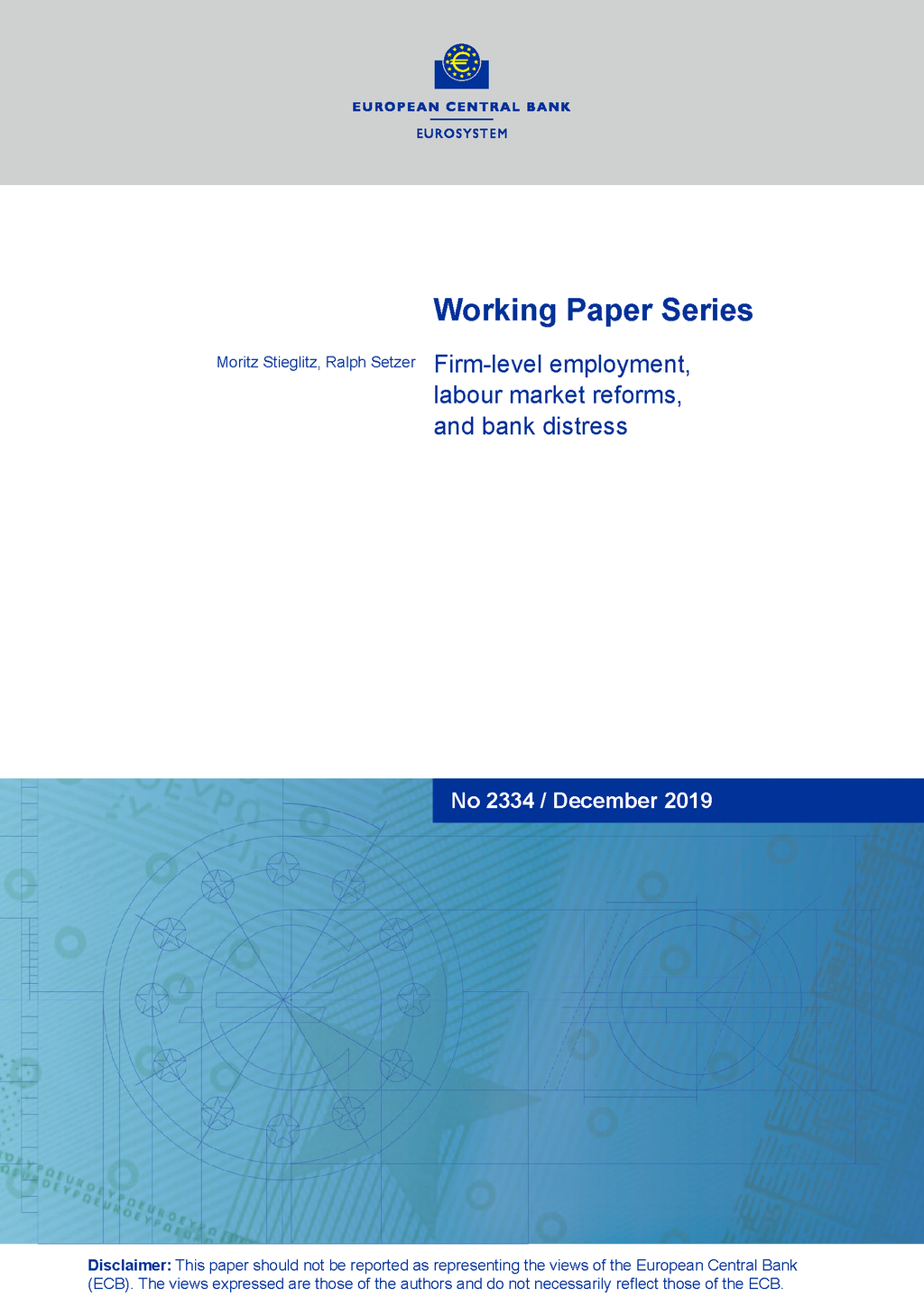
Climate Change-Related Regulatory Risks and Bank Lending
in: ECB Working Paper, Nr. 2670, 2022
Abstract
We identify the effect of climate change-related regulatory risks on credit real-location. Our evidence suggests that effects depend borrower's region. Following an increase in salience of regulatory risks, banks reallocate credit to US firms that could be negatively impacted by regulatory interventions. Conversely, in Europe, banks lend more to firms that could benefit from environmental regulation. The effect is moderated by banks' own loan portfolio composition. Banks with a portfolio tilted towards firms that could be negatively a affected by environmental policies increasingly support these firms. Overall, our results indicate that financial implications of regulation associated with climate change appear to be the main drivers of banks' behavior.
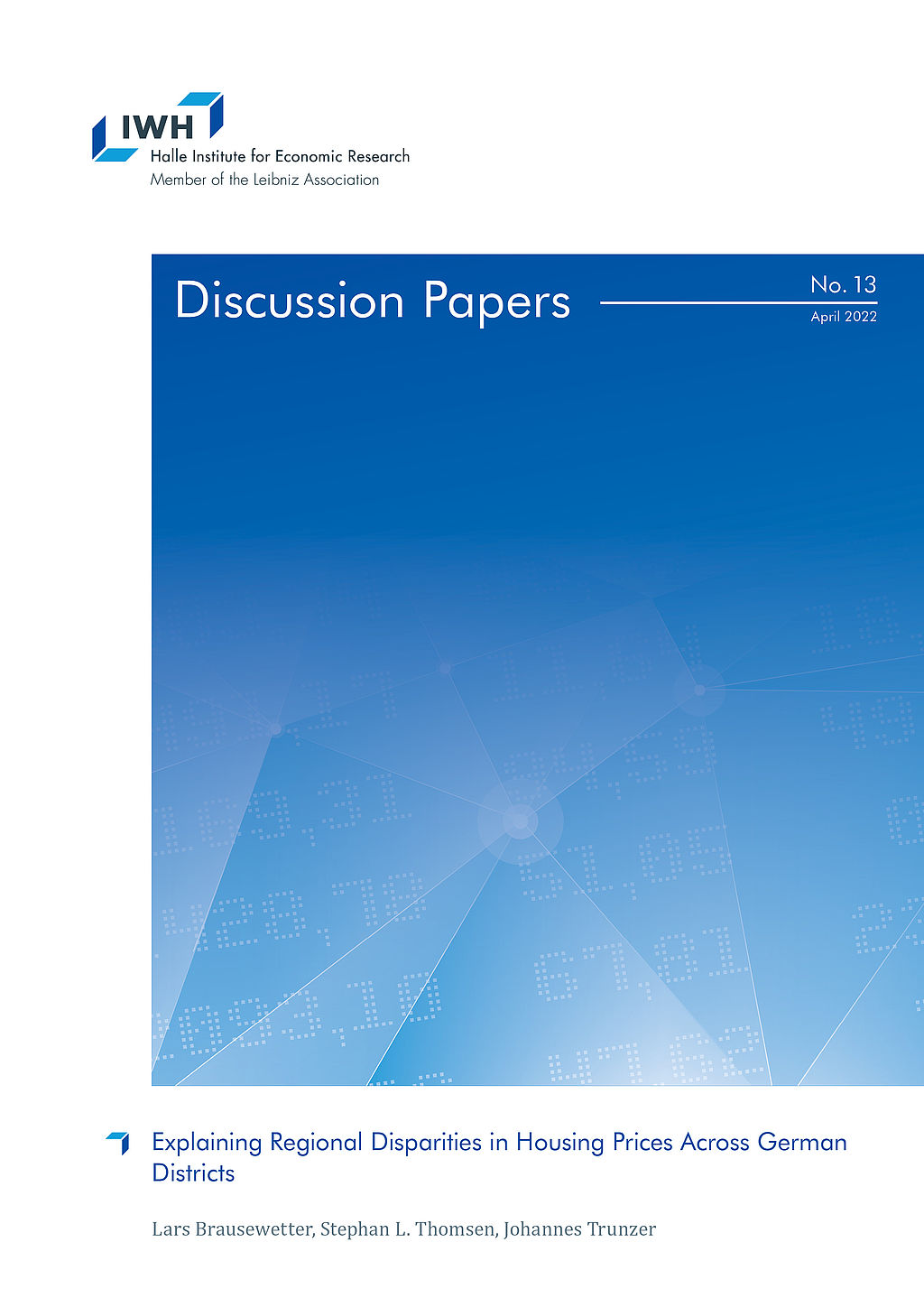
Explaining Regional Disparities in Housing Prices Across German Districts
in: IWH Discussion Papers, Nr. 13, 2022
Abstract
Over the last decade, German housing prices have increased unprecedentedly. Drawing on quality-adjusted housing price data at the district level, we document large and increasing regional disparities: Growth rates were higher in 1) the largest seven cities, 2) districts located in the south, and 3) districts with higher initial price levels. Indications of price bubbles are concentrated in the largest cities and in the purchasing market. Prices seem to be driven by the demand side: Increasing population density, higher shares of academically educated employees and increasing purchasing power explain our findings, while supply remained relatively constrained in the short term.
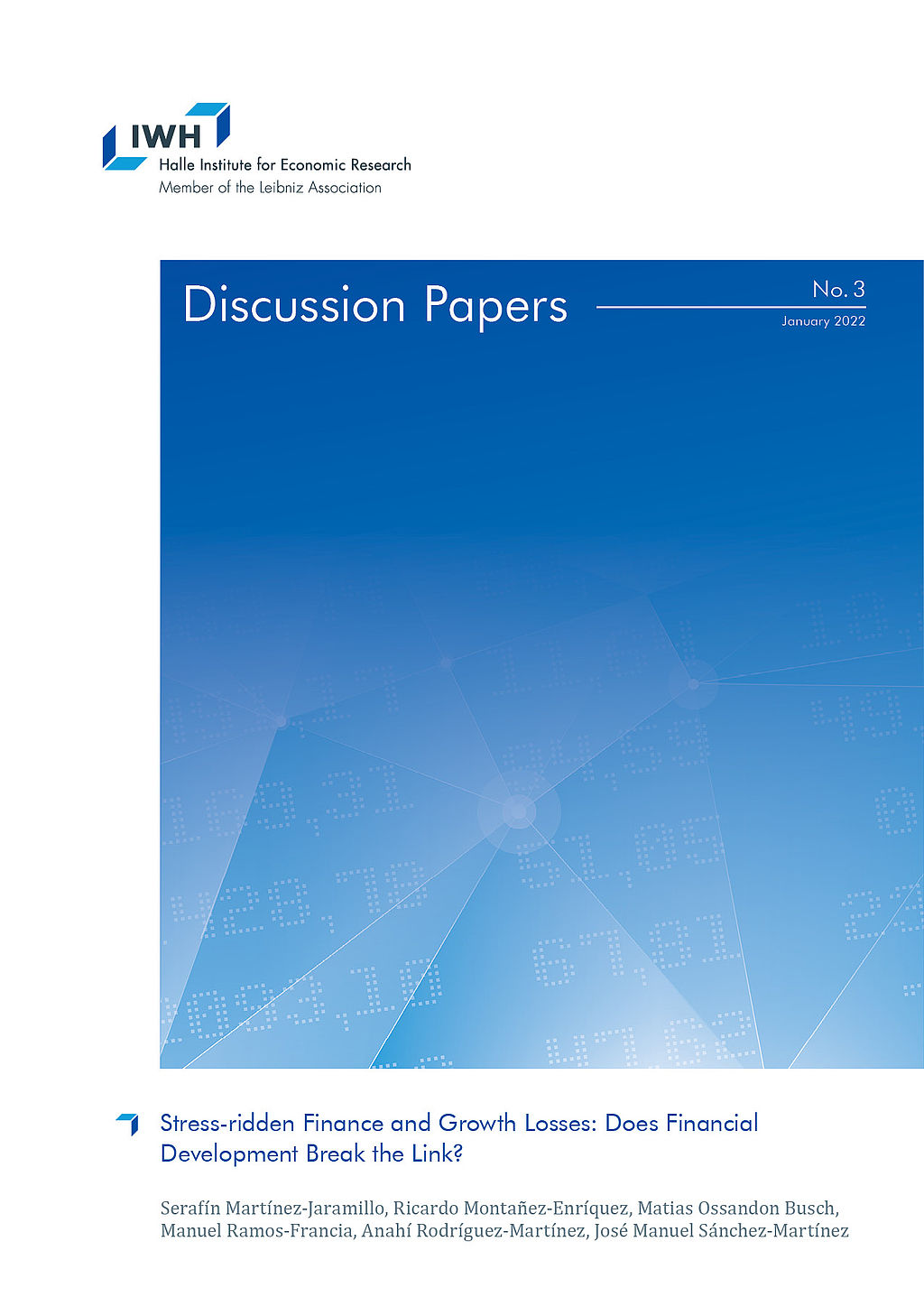
Stress-ridden Finance and Growth Losses: Does Financial Development Break the Link?
in: IWH Discussion Papers, Nr. 3, 2022
Abstract
Does financial development shield countries from the pass-through of financial shocks to real outcomes? We evaluate this question by characterising the probability density of expected GDP growth conditional on financial stability indicators in a panel of 28 countries. Our robust results unveil a non-linear nexus between financial stability and expected GDP growth, depending on countries’ degree of financial development. While both domestic and global financial factors affect expected growth, the effect of global factors is moderated by financial development. This result highlights a previously unexplored channel trough which financial development can break the link between financial (in)stability and GDP growth.














